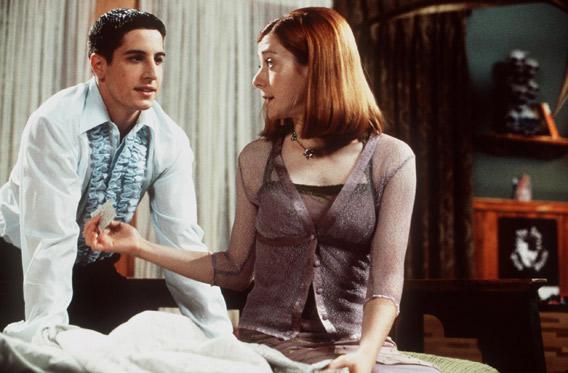“Let MTV come along on your journey … as you try to lose your virginity!” said an early-May casting call for a new show the network was planning, called My First… . The posting reassured would-be reality-TV stars that My First would document their efforts to lose “it,” but “NOT the act itself,” and asked applicants 18 and over to “be as detailed as possible” about why they were ready to have sex for the first time.
News of the casting call was picked up by conservative commentators, who pronounced themselves disgusted by MTV. “A sleazy exploitation of some of our most vulnerable citizens,” wrote a Breitbart blogger. “Pandering to the gutter,” said conservative media critic Dan Gainor. “Tawdry,” said Focus on the Family president Jim Daly. In late May, after much outcry, MTV pulled the posting and announced it wasn’t pursuing a pilot.
But aside from the admittedly smarmy language of MTV’s casting call (“We won’t judge—the more you can share, the better!”), is a show about virginity loss really such a bad idea? What seems at first like an exploitation of teenage innocence might, in fact, have been a worthwhile exploration, bringing nuance and emotional weight to a topic usually consigned to slapstick and blunt cautionary tales.
We are, after all, a nation profoundly in the grip of virginity fixation, from both secular and religious quarters; a nation entertained by hijinks-rich sex quests like The Virginity Hit and bound by daddy-daughter virginity pledges. Even on Girls, the virgin is obsessed with her virginity. By its very nature, My First would have fetishized the idea of sexual firsts, but, assuming the show would have been more in the vein of 16 and Pregnant and Teen Mom, than, say, A Shot at Love With Tila Tequila, it could have offered a balanced look at a phenomenon rarely discussed without the filter of cheap laughs or political agenda. Teenagers have sex, after all, though they’re a little older than they used to be, tending to lose it on average at 17. And while a teenager’s world seems terribly sexualized these days, the first-time experience is as awkward or traumatic or wonderful as it’s ever been, and sometimes all three at once. We are long overdue for a movie or TV series that takes teen sex seriously.
On the big screen in particular, teen sex is generally rendered flat. Going at least as far back as Porky’s, movies have treated virginity as a comical burden, with plots centering around efforts to do away with it. In Revenge of the Nerds this is accomplished through trickery (Lewis disguises himself with a Darth Vader mask); in American Pie through trickery, humiliation, and Stifler’s mom; in Superbad Fogell accomplishes it, or nearly does, after a complicated journey involving a fake ID, a bout of drunkenness, and speeding in a cop car.
If it’s the girl who’s having sex for the first time, forget gross-out humor. The act is now freighted with consequence. In Juno, a girl has sex and gets pregnant. In Saved!, same. In Fast Times at Ridgemont High, a girl has sex and then more sex and gets pregnant. In Cruel Intentions, a girl has sex and gets betrayed. As a Yahoo! Shine writer pointed out, when boys have sex it’s typically the culmination of a movie’s plot, whereas for girls, sex is where the movie’s storyline begins, unspooling into lies, tough choices, and shattered relationships.
The gender divide points to a basic fact about high school sex movies: Never mind the short-shorts and the shock value of masturbation-by-pie—Hollywood approaches virginity loss from an essentially conservative point of view. The late film critic Robin Wood once observed that ‘90s high school movies divvied “getting laid” and “falling in love” into entirely separate pursuits. “The ideal remains true love and monogamy; the women are divided into ‘nice girls’ (usually virgins) and ‘bitches,’ ” Wood observed. In this way, the movie industry gets to have it both ways—offering lots of tongue and titillation while endorsing only the right kind of sex. And, indeed, the American Pie series now includes American Wedding, assuring audiences that all’s well that ends in marriage.
If Hollywood is in many ways conservative about virginity, the broader culture has arguably moved that way, as well. In schools, as abstinence-only education gained currency in the ‘90s and 2000s, discussions of teenage sex were dominated by the conservative perspective. Evangelicals have also had some luck co-opting the language of sex-positivity, placing it firmly within the parameters of marriage. In Sex in Crisis, Dagmar Herzog suggests that “the conversation on sex in America—when sex is discussed in a serious and earnest way at all—tends largely to adopt the parameters set by the religious Right.”
It’s not quite clear why MTV dropped plans for the pilot of My First; the network wouldn’t offer an explanation. Certainly they’ve fielded outrage for far more shocking shows before, and it seems unlikely that outrage would be a deterrent in any case. What is clear is that the abandonment of a documentary-style series about teenage and twentysomething sex is a missed opportunity.
Quite aside from Jersey Shore, MTV has in recent years shown itself to be capable of sensitive portrayals of adolescent sexuality and its consequences. 16 and Pregnant and its Teen Mom spinoffs show it all—the naïveté of first loves, the stresses and negotiations of family life, the terribly adult problem of shared custody. We all agree it matters why and when young adults decide to lose their virginity, or why not to. It’s time we gave them an opportunity to tell us about it.
